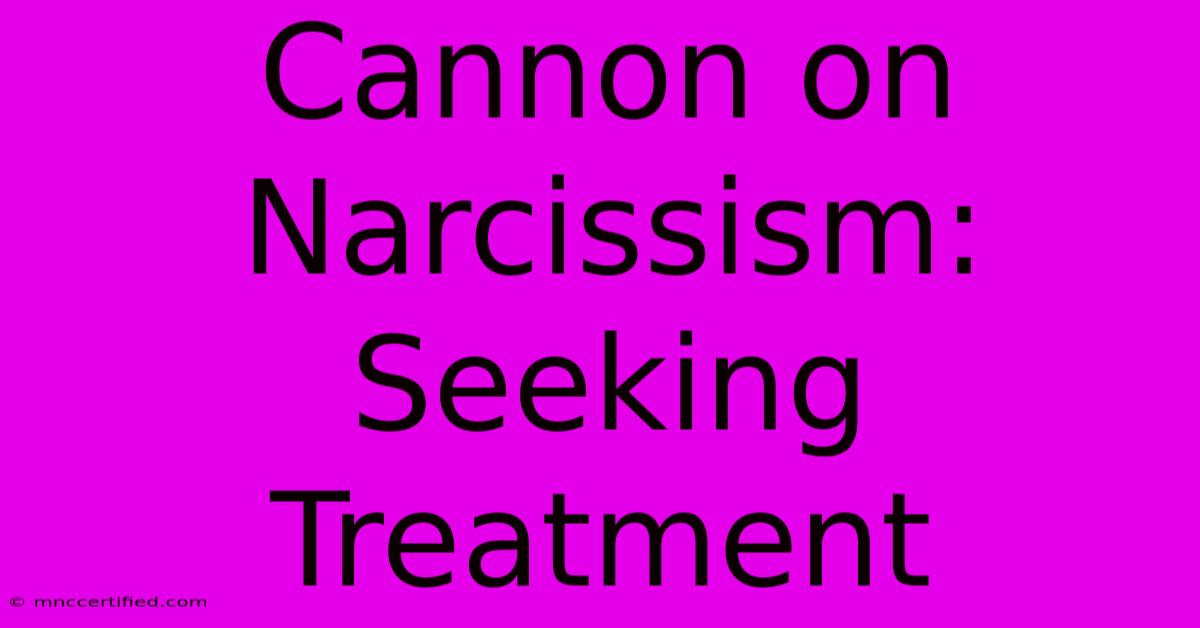Cannon On Narcissism: Seeking Treatment

Table of Contents
Cannon on Narcissism: Seeking Treatment – A Comprehensive Guide
Narcissistic Personality Disorder (NPD) is a complex mental health condition characterized by an inflated sense of self-importance, a need for admiration, and a lack of empathy. While many associate narcissism with arrogance and self-centered behavior, understanding the nuances of NPD and the path to seeking treatment is crucial for both individuals struggling with the disorder and their loved ones. This article delves into the complexities of seeking treatment for narcissism, drawing parallels with the work of leading experts in the field.
Understanding the Challenges in Seeking Treatment for Narcissism
One of the significant hurdles in treating NPD is the individual's lack of self-awareness. Individuals with NPD often don't recognize their behaviors as problematic or needing intervention. They may believe they are superior to others and thus, don't require help. This inherent resistance to acknowledging a problem forms a major obstacle to initiating treatment.
The Role of Denial and Defense Mechanisms
The ego defense mechanisms employed by individuals with NPD are incredibly strong. They often project blame onto others, minimizing their own contributions to conflicts or relational problems. This makes it challenging for therapists to establish a therapeutic alliance, a cornerstone of successful treatment.
Identifying the Need for Help: Recognizing the Signs
Before seeking professional help, it's important to recognize the signs of NPD. These can include:
- Grandiosity: Exaggerated sense of self-importance and abilities.
- Need for admiration: Constant seeking of praise and validation.
- Lack of empathy: Inability to understand or share the feelings of others.
- Entitlement: Unreasonable expectation of special treatment.
- Interpersonal exploitation: Using others to achieve personal goals.
- Envy and arrogance: Feeling envious of others and believing they are superior.
If you or someone you know exhibits these traits consistently and they are causing significant distress or impairment in daily life, seeking professional help is essential.
Finding the Right Therapist: Expertise in NPD
Finding a therapist experienced in treating NPD is paramount. Not all therapists are equally equipped to handle the unique challenges presented by this disorder. Look for therapists specializing in personality disorders, particularly NPD.
Therapeutic Approaches for NPD
Several therapeutic approaches have proven effective in treating NPD:
- Psychodynamic therapy: Explores unconscious patterns and motivations driving narcissistic behaviors.
- Cognitive Behavioral Therapy (CBT): Helps identify and modify negative thought patterns and behaviors.
- Schema therapy: Addresses maladaptive schemas (core beliefs) developed in early childhood that contribute to narcissistic traits.
- Transference-focused psychotherapy: Utilizes the therapeutic relationship to address relational patterns and deficits in empathy.
The Treatment Process: A Long-Term Commitment
Treatment for NPD is typically a long-term process requiring significant commitment from both the patient and the therapist. Progress is often gradual and may involve setbacks. Patience and perseverance are key.
Building Self-Awareness and Empathy
A core component of successful treatment is fostering self-awareness and empathy. Therapists work to help individuals with NPD understand the impact of their behaviors on others and develop healthier coping mechanisms.
Addressing Underlying Issues
Treatment often involves addressing underlying issues contributing to NPD, such as trauma, neglect, or insecure attachments from childhood.
Support for Loved Ones
Living with someone with NPD can be incredibly challenging. Support groups and family therapy can be invaluable resources for loved ones seeking guidance and support in navigating these complex relationships.
Conclusion: Hope and Recovery are Possible
While NPD presents significant challenges, effective treatment is possible. Seeking professional help from a qualified therapist specializing in personality disorders is the crucial first step toward improved mental health and healthier relationships. Remember, acknowledging the need for help and committing to the treatment process are vital for achieving lasting positive change. With dedication and the right support, recovery and improved well-being are attainable.

Thank you for visiting our website wich cover about Cannon On Narcissism: Seeking Treatment. We hope the information provided has been useful to you. Feel free to contact us if you have any questions or need further assistance. See you next time and dont miss to bookmark.
Featured Posts
-
Swatch James Bond Collection
Nov 30, 2024
-
Five Years On Notre Dames Rebirth
Nov 30, 2024
-
Best Air Pods Black Friday Deals 2024
Nov 30, 2024
-
Predicting Georgia Vs Georgia Tech Football Score
Nov 30, 2024
-
College Football Playoff Potential Upsets
Nov 30, 2024